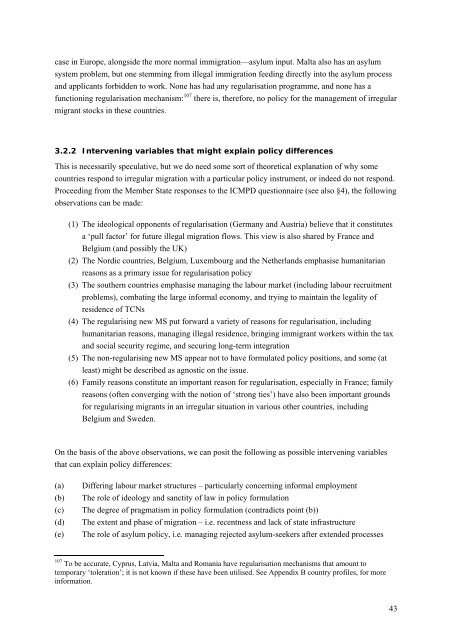REGINE Regularisations in Europe Final Report - European ...
REGINE Regularisations in Europe Final Report - European ...
REGINE Regularisations in Europe Final Report - European ...
Create successful ePaper yourself
Turn your PDF publications into a flip-book with our unique Google optimized e-Paper software.
case <strong>in</strong> <strong>Europe</strong>, alongside the more normal immigration—asylum <strong>in</strong>put. Malta also has an asylum<br />
system problem, but one stemm<strong>in</strong>g from illegal immigration feed<strong>in</strong>g directly <strong>in</strong>to the asylum process<br />
and applicants forbidden to work. None has had any regularisation programme, and none has a<br />
function<strong>in</strong>g regularisation mechanism: 107 there is, therefore, no policy for the management of irregular<br />
migrant stocks <strong>in</strong> these countries.<br />
3.2.2 Interven<strong>in</strong>g variables that might expla<strong>in</strong> policy differences<br />
This is necessarily speculative, but we do need some sort of theoretical explanation of why some<br />
countries respond to irregular migration with a particular policy <strong>in</strong>strument, or <strong>in</strong>deed do not respond.<br />
Proceed<strong>in</strong>g from the Member State responses to the ICMPD questionnaire (see also §4), the follow<strong>in</strong>g<br />
observations can be made:<br />
(1) The ideological opponents of regularisation (Germany and Austria) believe that it constitutes<br />
a ‘pull factor’ for future illegal migration flows. This view is also shared by France and<br />
Belgium (and possibly the UK)<br />
(2) The Nordic countries, Belgium, Luxembourg and the Netherlands emphasise humanitarian<br />
reasons as a primary issue for regularisation policy<br />
(3) The southern countries emphasise manag<strong>in</strong>g the labour market (<strong>in</strong>clud<strong>in</strong>g labour recruitment<br />
problems), combat<strong>in</strong>g the large <strong>in</strong>formal economy, and try<strong>in</strong>g to ma<strong>in</strong>ta<strong>in</strong> the legality of<br />
residence of TCNs<br />
(4) The regularis<strong>in</strong>g new MS put forward a variety of reasons for regularisation, <strong>in</strong>clud<strong>in</strong>g<br />
humanitarian reasons, manag<strong>in</strong>g illegal residence, br<strong>in</strong>g<strong>in</strong>g immigrant workers with<strong>in</strong> the tax<br />
and social security regime, and secur<strong>in</strong>g long-term <strong>in</strong>tegration<br />
(5) The non-regularis<strong>in</strong>g new MS appear not to have formulated policy positions, and some (at<br />
least) might be described as agnostic on the issue.<br />
(6) Family reasons constitute an important reason for regularisation, especially <strong>in</strong> France; family<br />
reasons (often converg<strong>in</strong>g with the notion of ‘strong ties’) have also been important grounds<br />
for regularis<strong>in</strong>g migrants <strong>in</strong> an irregular situation <strong>in</strong> various other countries, <strong>in</strong>clud<strong>in</strong>g<br />
Belgium and Sweden.<br />
On the basis of the above observations, we can posit the follow<strong>in</strong>g as possible <strong>in</strong>terven<strong>in</strong>g variables<br />
that can expla<strong>in</strong> policy differences:<br />
(a)<br />
(b)<br />
(c)<br />
(d)<br />
(e)<br />
Differ<strong>in</strong>g labour market structures – particularly concern<strong>in</strong>g <strong>in</strong>formal employment<br />
The role of ideology and sanctity of law <strong>in</strong> policy formulation<br />
The degree of pragmatism <strong>in</strong> policy formulation (contradicts po<strong>in</strong>t (b))<br />
The extent and phase of migration – i.e. recentness and lack of state <strong>in</strong>frastructure<br />
The role of asylum policy, i.e. manag<strong>in</strong>g rejected asylum-seekers after extended processes<br />
107 To be accurate, Cyprus, Latvia, Malta and Romania have regularisation mechanisms that amount to<br />
temporary ‘toleration’; it is not known if these have been utilised. See Appendix B country profiles, for more<br />
<strong>in</strong>formation.<br />
43
















